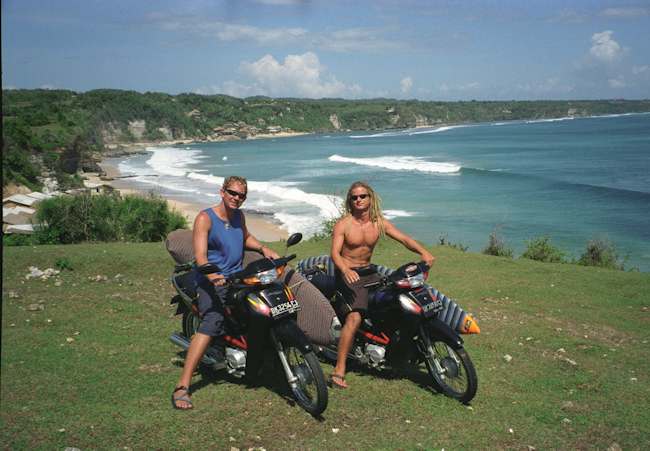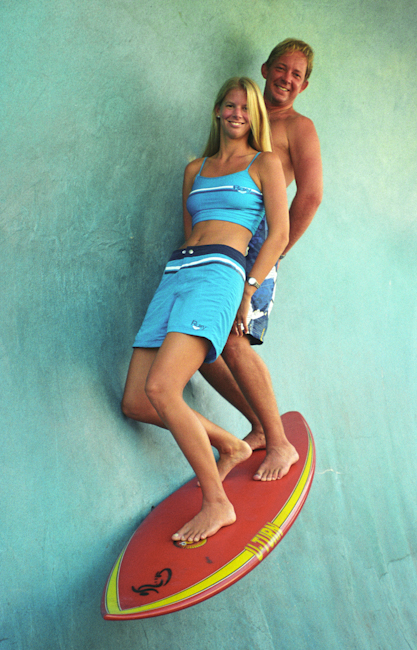Krazy Kuta
“TRANSPORT? MASSAGE? BRAID YOUR HAIR? SARONG? TOE RING? PINEAPPLE? HASHISH?”
The endless barrage of hawkers accosted us while we walked down the street attempting to dodge them, puddles, and the screeching motor scooters that zoomed by perilously close. Welcome to Indonesia and it’s most popular tourist destination, Kuta Beach.
Travelers have a love/hate relationship with this city of sin. Backpacker facilities are plentiful and cheap – rooms average only US$4.50 a night, tasty wood oven pizzas and a large Bintang beer cost just a buck each. The rupee has remained devalued since the Asian economic crisis – the average Indonesian worker earns only US$25 a month. It’s a place that encourages excesses; buying too much from the hundreds of surf, handicraft, and silver shops that line every street; eating and partying ’til sunrise at the packed restaurants, bars, and clubs; surfing too long at Kuta’s easily accessible consistent beach breaks that are polluted with sewage that eventually makes everyone sick.
Yet in the middle of this chaos, pieces of traditional Balinese culture still survive. Every morning Hindus place offering baskets of food, incense, and flowers at the entrance to their shops, homes, and in shrines that are a familiar sight at every corner. Women still walk along traffic-clogged streets carrying baskets of fruit on their heads to bring to the market or a ceremony. Even in the courtyard of our hotel we enjoyed an interesting contrast watching the owners perform an elaborate anniversary ceremony while backpackers continued to wander through in their swimsuits carrying surfboards.
An essential art Indonesians have mastered is bargaining. Westerners are constantly targeted and usually quoted prices 10 times higher for ‘tourists’ than locals. Unscrupulous ‘authorized’ moneychangers are everywhere. We noticed the tip off to possible rip-off when finding posted exchange rates that seemed too good to be true. On two separate occasions we were entertained by these sly characters. Our first attempt to change US$100 (which equals $1,130,000 rupees) was an example of short-changing. Upon careful counting we noticed the agent kept adding small bills to the pile, insisting to keep a small amount of our money for himself for ‘good luck’. Finally we were disgusted and exited to find another moneychanger, shouting in the street, “This guy’s a thief!” The second character was much sneakier. He quickly entered an amount on his calculator showing the total while handing over the rupees. Had we not been suspicious we could have easily overlooked that his calculator didn’t work correctly and he ‘miscalculated’ the amount by 90,000 rupees in his favor. We learned to always count our cash before leaving since ‘honest’ little mistakes seem to happen frequently in Bali.
Another tourist rip off is the long arm of the law, which is always reaching out palm turned up! Bali police set up roadblocks and target tourists in rentals cars and motor scooters. We had been lucky enough to avoid them for a month until getting nabbed by one of their street corner outposts. We were ushered into an outhouse-sized office and informed of our violations. No international driver’s license (fine $50,000 rupees), impeding traffic – we stopped at a red light, getting in the way of those running it! (fine $30,000 rupees), and running a red light because we stopped after the painted line (fine $40,000 rupees). We now owed $120,000 rupees in fines which were payable in front of a judge at the city courthouse…OR the helpful police could take care of our fine for us (wink, wink) if we would just give them the money.
Fortunately, before we had entered the office we quickly removed all but $51,000 rupees from our pockets and hid it. During our interrogation we convinced the police that this was all the money we had and plea bargained our fine down to ‘coincidentally’ $51,000 rupees. As we reached for our cash and held it up high enough for anyone passing by to see, they excitedly pushed our hands down out of view, which we quickly lifted up again just for the fun of it. Putting on our helmets and thanking the officers for their help we hopped on our scooter and rode off laughing about our ‘bribery in Bali’ experience. Something anyone visiting Bali can also be guaranteed to experience is genuinely friendly, helpful, and honest people, unfortunately it just takes some work find them.
Our real reason for basing ourselves in Kuta was to escape on daily surf safari adventures. Thirty years ago Kuta beach was ‘discovered’ as a surfers’ Mecca; now it’s overwhelmed with tourists, traffic, and hawkers, a paradise lost. After reuniting with Jay, he showed us a secret route that would eventually escape the busy streets and police by taking dirt paths through plantations and cow pastures, ending up at surf spots with names like Balangan, Nyang Nyang, Padang Padang, Impossibles, Ulu Watu, and Dreamland. More often than not the surf was on a shallow reef break or too big for beginners like us, so we relaxed on the beach watching Jay rip it up. On smaller surf days at sandy beach breaks we managed to catch a few waves of our own.
Another easy day trip from Kuta (although we recommend spending at least four days) is Ubud, the ‘cultural center’ of Bali. Stepping off the bus in Ubud we were promptly greeted with a variety of accommodation and transport options. We chose the Tutick house, a small house situated in a garden setting away from street noise; it was clean, included a full breakfast, and had hot showers. Ubud is known for having the best prices and selection on traditional handicrafts, and nearby Celuk for sterling silver. Jay needed to purchase sarongs and jewellry for his enterprising business and we got the chance to act as shopping consultants. We also spent a day on our scooters riding around the nearby volcano and marveling at the beautifully terraced rice paddies that are still cultivated by hand
In the evenings we enjoyed the varied nightlife and splurged on a gourmet dinner that rivaled many of our favorite restaurants at home in Portland. We also had the opportunity to see a traditional Balinese dance show at the palace temple; it was both strange and interesting, with ornate costumes and complex movements, – we would have needed an interpreter to understand the play’s meaning. To our surprise Ubud even had a jazz club with live music so we checked it out and had a great time listening to the energetic band. Although known as a tourist town, Ubud didn’t have that over-run atmosphere we dread, and was a refreshing change of pace.
If you really want to get away from it all, head to the Gili Islands just off the mainland on Lombok. Leaving at 5 am, we caught Kuta sleeping while waiting for our transport. The partiers had staggered to bed, motor scooters hadn’t started their daily assault, and the tourist’s shops were closed – even the hotel staff was fast asleep on the floor in front of the reception.
Our trip to Gili Air was a 14-hour journey the cheap way (or a 3 hour flight for those with more money than time). Our itinerary included a local bus, slow ferry, another local bus and ended with an ocean-drenching small boat. Arriving on Gili Air just after sunset, we raced to find accommodation before dark, which we discovered wasn’t easy. Locals kept saying “island full, no rooms”. Walking the sandy trail nearly around the island we found a very rustic thatched hut that probably was the last room available, so we kicked out the mice and moved in. Tired, grumpy, and hungry we collapsed in the heat and tried to sleep. The rooster alarm clock awoke us early so we had breakfast and decided to search for better accommodations, hoping that some people had checked out. Luckily we found a newly constructed bungalow and we were the first people to stay in it.
The three Gili Islands, Taranga (party island), Meno (solitude island), and Air (a mix of both) are void of any vehicles except horse drawn carts, thus offering us the quiet slow pace we needed. We spent our days sneaking into the nearby expensive hotel pool (rooms US$28 per night), laying in our hammock, recovering from a bout of Bali belly, reading, talking, writing stories, and watching sunsets from the unique individual eating platforms.
People may wonder why would we need to relax since we’re traveling for 14 months. Fun as it’s been, traveling cheaply, doing our own planning, and trying to stay healthy takes work. Recharged after eight days we moved on, using the same transport method in reverse. Our total round trip transport cost was US$18 dollars for two. In fact, during our entire six week Indonesia stay we only spent U.S. $693 for all our accommodations, meals, transportation, & entertainment – by far the best bargain of our trip thus far. I guess we got exactly what we paid for and more.



Leave a Reply
You must be logged in to post a comment.